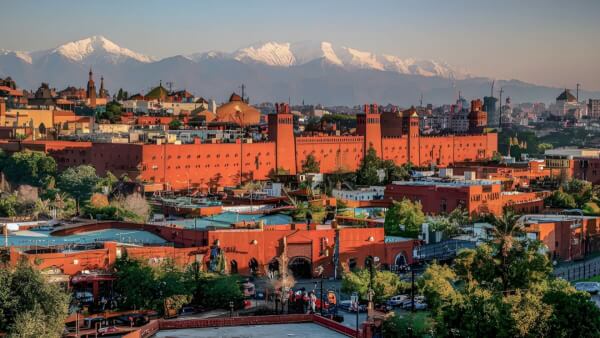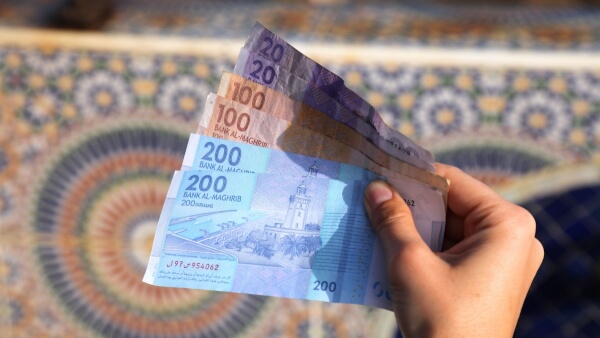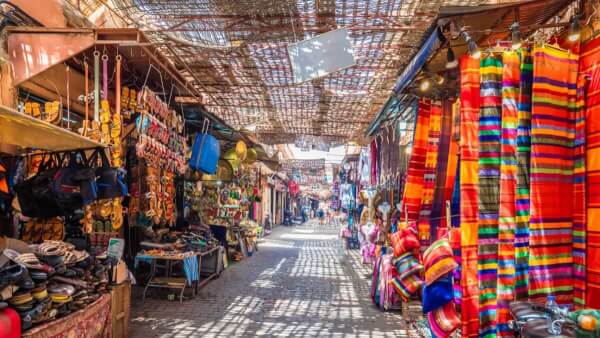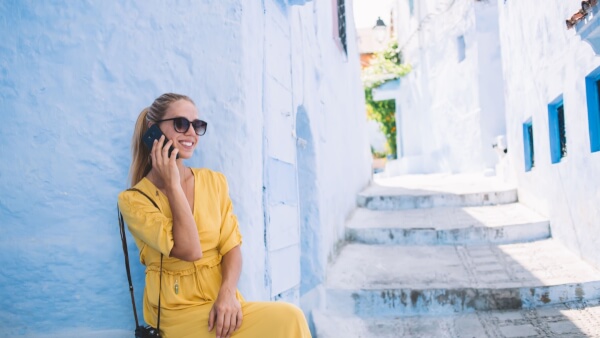Morocco tourist tax: What you need to know in 2025
Travelling to Morocco soon? Find out everything about the tourist tax in Morocco and essential travel tips.

Planning a trip to Morocco? Whether it’s a beach trip to Agadir, cultural tour of Marrakech, a work trip or perhaps even a longer stay, you’ll need to know the rules around bringing cash into the country.
Lots of tourists travel with cash, but usually not enough that they fall foul of customs rules. But if you are travelling in or out of Morocco with a large amount of cash in your wallet, this guide is for you.
Below, we’ll take a look at the rules and limits for taking cash in or out of Morocco. Plus, info on how and when to declare cash, and what happens if you carry too much without declaring it.
We’ll also show you a convenient cash-free alternative for spending in Morocco and worldwide - the Wise card.
You can bring any amount of foreign currency into Morocco. However, you must declare anything worth 100,000 Moroccan dirham or more to customs authorities.1 This is around £8,189 in GBP.
The limit for bringing the local currency - the Moroccan dirham - into the country is 2,000 MAD.1
For the purposes of moving it across international borders, the following are usually classed as cash:

Under the country’s customs rules, you may face penalties if you bring currency worth more than 100,000 Moroccan dirham (MAD) into the country without declaring it.
It’s likely that the money will be seized, and there may be other consequences such as prosecution, fines and even imprisonment.
Never had to deal with foreign customs authorities before? It’s understandable to feel a little daunted and unsure of the process.
We’re here to help, with some info on how to declare cash at the airport in Morocco.
In some countries, you can save time at customs by declaring cash before you travel. There may be ways to submit a form online, for example.
However, this option doesn't seem to be available in Morocco. On the country’s customs authority website, it states that:2
“The forms to be used to submit the foreign currency declaration will be provided to you upon request by the customs services at the borders.”
To declare cash at an airport or seaport (i.e. a cruise terminal) once you arrive in Morocco, follow these steps:
If you can’t find a declaration point, ask at the airport or seaport’s information desk. You can also find contact details for Morocco customs services here.
While you may not be asked for all of it, it’s sensible to have the following ready to provide at customs:

You can take foreign currency (i.e. GBP) worth up to 100,000 Moroccan dirham in cash out of the country without needing to declare it to customs officials. Anything over this must be declared at the border.1
The limit for taking Moroccan dirham out of the country is 2,000 MAD. This isn’t a case of declaring any excess - it’s actually illegal to exceed this limit, as MAD is what is known as a ‘closed currency’.2
So if you have more than this, you must exchange it to another currency before you travel.
Each African country will have its own rules and limits for how much cash you can bring in. So, it’s important to do some research before you travel, so you can avoid falling foul of the rules.
But you also need to take the UK’s own rules into account. You can take up to £10,000 out of the UK without having to make a customs declaration.3
If you bring too much cash into Morocco or fail to declare it, you risk your money being seized. There may also be other penalties or consequences, so it really isn’t worth taking any chances.
No matter where you’re travelling to once you leave Morocco, you’ll need to declare any foreign currency in cash exceeding 100,000 MAD to customs authorities.1
All onward destinations require a customs declaration if you’re carrying more than 100,000 MAD,1 except if you’re travelling between locations within Morocco itself.

Travelling with large amounts of cash is a security risk, so it’s best avoided unless absolutely necessary. Consider spending on a card instead or withdrawing cash at a Moroccan ATM on arrival - you’ll find them outside Moroccan banks and in most commercial centres.
If you do need to carry cash, the safest way to carry it is on your person. So, it could be worth investing in a decent money belt to wear under your clothes.
Carrying one big wad of cash isn’t very discreet, and it’s risky too - if it’s lost or stolen, you’d have no spending money left at all.
So consider splitting your money between a money belt worn on your person, between members of your travelling party, and between pieces of luggage too.
If you’re carrying money to pay for your trip and need to exchange it once you get to Morocco, you might struggle to find a good deal. This is especially true of exchanging cash in airports and hotels, where exchange rates are notoriously poor.
Rather avoid the security worries and inconvenience of carrying cash between countries? Check out the Wise card instead.
It’s a truly international debit card, as it works in 150+ countries including Morocco without any foreign transaction fees*.
Best of all, your Wise card automatically converts currency at the mid-market exchange rate whenever you spend, for just a small conversion fee*. If you already have the currency in your Wise account, there’s no fee to pay.
You can also use Wise to send money worldwide for great exchange rates and low fees*.
As well as currency, you need to declare the following when arriving or leaving in Morocco:
Cash is one of the most popular payment methods in Morocco, so it’s a good idea to have some in your travel wallet. If nothing else, you’ll need it for tipping, shopping at souks and street food vendors, and perhaps for taxis and transport too.
In terms of how much spending money you’ll need in Morocco, you might want to budget for around £40-£50 per person a day.4
Debit and credit cards are accepted in Morocco’s bigger towns and cities, but cash is still king in many places. So, it’s a good idea to take a mix of cash and cards to Morocco, then you’ll have all bases covered.
Sources used:
1. GOV.UK - Morocco Entry Requirements
2. Administration Des Douanes Et Impôts Direct - info for foreigners visiting Morocco
3. GOV.UK - taking cash in and out of the UK
4. Holiday Hypermarket- currency and prices in Morocco
Sources last checked on date: 17-Jan-2025
*Please see terms of use and product availability for your region or visit Wise fees and pricing for the most up to date pricing and fee information.
This publication is provided for general information purposes and does not constitute legal, tax or other professional advice from Wise Payments Limited or its subsidiaries and its affiliates, and it is not intended as a substitute for obtaining advice from a financial advisor or any other professional.
We make no representations, warranties or guarantees, whether expressed or implied, that the content in the publication is accurate, complete or up to date.

Travelling to Morocco soon? Find out everything about the tourist tax in Morocco and essential travel tips.

Should you pay with cash or card in Morocco? A handy guide including cash etiquette, Moroccan ATMs and using your UK card.

What is the best currency to take to Morocco? Read our guide on currency in Morocco, accepted payment methods and more.

Can I use Revolut in Morocco? A handy guide covering using your Revolut card and account in Morocco, spending in MAD and more.

Check out our in-depth guide on everything you need to know about buying a prepaid Morocco SIM card, including different providers, pricing, and features.

Check out our handy guide to using PayPal in Morocco, including what fees you can expect.